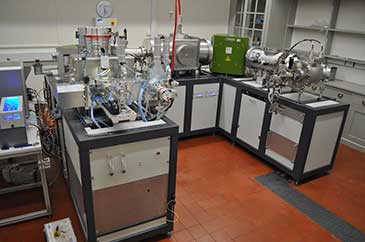The Bristol Radiocarbon Accelerator Mass Spectrometer (BRAMS) is based on one of the new generation of ultra-compact high-precision AMS instruments and will be used for 14C analysis in environmental, archaeological and palaeoenvironmental research. The term ultra-compact is relative, as the instrument weighs 4.5 metric tonnes and needed an industrial forklift truck to unload it from the delivery vehicle.
Professor Richard Evershed of the School of Chemistry, who is leading the BRAMS project, said: 'The new AMS achieves a long-held scientific ambition and opens up major new opportunities for probing the past and present Earth system.'
Dr Laura Robinson of the School of Earth Sciences, and a member of the BRAMS Steering Group, added that the new facility 'will be used in diverse investigations ranging from the deep oceans to across the continents, including for example, discovering how and why deep water coral ecosystems respond to climate change'. Other projects already supported are investigations of carbon dioxide dynamics in the global atmosphere, while in archaeology new possibilities are being explored for absolute dating.
This project is supported by the University of Bristol, the Natural Environment Research Council (NERC) and the Biotechnology and Biological Sciences Research Council (BBSRC), building on the University’s international reputation for technology-based research. It is a collaborative venture between Bristol and instrument designers at ETH Zurich, Switzerland, with a major aim of refining AMS methods for small sample analysis. The instrument also includes novel eco-friendly 'green magnet' technology. The facility constitutes an important addition to the UK’s radiocarbon analysis repertoire, in particular opening up new opportunities for high precision AMS analyses of solids, gases and even single compounds at microgram levels.
The facility is housed in purpose-built laboratories funded by the University of Bristol, in the Department of Archaeology and Anthropology. According to department head Dr Jo Bruck, 'The accelerator will be of particular value to Bristol archaeology, because it provides the opportunity to date tiny archaeological samples in greater numbers. This means the analysis is both non-destructive to precious materials, and potentially allows much more accurate dating by focusing on micro-remains directly related to human activities.'
The project builds on the University’s extensive experience with running high-end multi-user instrument facilities. Professor Evershed added: 'The instrument adds to the already world-class portfolio of environmental mass spectrometry facilities available within the Schools of Chemistry and Earth Sciences.'
The project was conceived through wide consultations with end users, and is being developed as a national capability under NERC, BBSRC initiative and South West Universities GW4 collaborations.
For further information, contact Professor Richard Evershed: r.p.evershed@bristol.ac.uk
